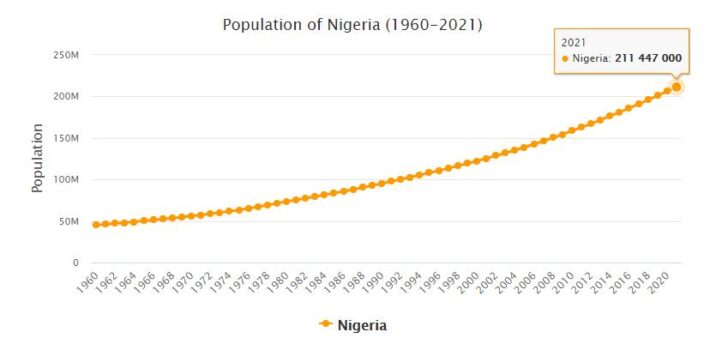Yearbook 2012
Nigeria. The country was shaken by continued acts of violence during the year, many of which were attributed to the extremist Muslim sect Boko Haram. In the northern city of Kano, the movement carried out coordinated attacks on January 20, killing over 180 people. The sect, whose name roughly means “Western education is a sin”, had previously urged Christians to leave Northern Nigeria. The authorities responded with mass arrests and raided the sect’s detention.
- AbbreviationFinder.org: Provides most commonly used acronyms and abbreviations for Nigeria. Also includes location map, major cities, and country overview.
Economy
| Inflation rate | 16.50% |
| Unemployment rate | 16.5% |
| Gross domestic product (GDP) | $ 1,121,000,000,000 |
| GDP growth rate | 0.80% |
| GDP per capita | 5,900 USD |
| GDP by sector | |
| Agriculture | 21.10% |
| Industry | 22.50% |
| Service | 56.40% |
| State budget | |
| Revenue | 17.5 billion |
| Expenditure | 18.67 billion |
| Proportion of the population below the national poverty line | 70% |
| Distribution of household income | |
| Top 10% | 38.2 |
| Lower 10% | 1.8 |
| Industrial production growth rate | -4.70% |
| Investment volume | 30.8% of GDP |
| National debt | 21.80% of GDP |
| Foreign exchange reserves | $ 31,080,000,000 |
| Tourism | 2013 |
| Number of visitors | 600,000 |
| Revenue | $ 601,000,000 |
Boko Haram was also accused of attacks on churches, schools, police stations, army offices and newspaper editorials. The movement also exempted hundreds of suspected supporters in the storms of prisons. The group was also blamed for attacks on Muslim leaders and mosques. in the city of Maiduguri in the northeast. Twenty suspected sect members were killed by military in the city, a stronghold for Boko Haram. The sabotage of cellphone masters also occurred, a revenge for the telecom companies allegedly helping the authorities to trace sect members.
The violence also triggered revenge attacks, which in June when six Muslim youths were killed by a mob in the city of Jos in central Nigeria since two churches were attacked.
President Goodluck Jonathan toned down the threat from Boko Haram during a visit to Germany in April. But neighboring Chad President Idriss Déby warned that the movement could threaten stability in the region.
The human rights group Human Rights Watch stated that by September more than 815 people had been killed in attacks attributed to Boko Haram. The figure was higher than during the whole of 2010 and 2011.
The security forces were criticized by Amnesty International for summary executions, assault and imprisonment without trial in attempts to crush the movement.
In June, the president dismissed his security adviser and the defense minister. Jonathan said changes were necessary as Boko Haram “changed his tactics daily”.
There were information about informal conversations with the sect, but in November, the president said that no talks were held as it was impossible to negotiate with a “faceless” group. In November, the army pledged a reward of SEK 12 million for 19 of the movement’s top executives.
In addition to the security situation, Jonathan’s government was also pressured by other problems. It was forced to withdraw plans to abolish subsidies on fuel after extensive protests and strikes broke out at the beginning of the year. Suspected corruption with government fuel subsidies also created headaches. A parliamentary report stated the decline to $ 6.8 billion since 2009. President June replaced the head of the Nigerian National Petroleum Corporation state oil company and three other directors.
Despite Nigeria being Africa’s leading oil exporter, the country imports a large proportion of its refined oil products. In July, a letter of intent was signed with American Vulcan Petroleum to build six oil refineries. The deal was worth $ 4.5 billion.
Thefts of oil and sabotage of pipelines continued, causing production losses as well as environmental degradation. In London, a trial was started in which 11,000 people from a affected area in the Niger Delta demanded damages from the oil company Shell following previous oil spills.
Severe floods – the worst in over 40 years – during the July-October rainfall required more than 360 lives, while two million people became homeless. Oil production in the Niger Delta was also disrupted.
The president announced three days of national grief in June after a domestic plan with 153 aboard crashed into a suburb of Lagos, the country’s economic capital. Everyone on board died, as did at least ten on the ground. The airline Dana Air resumed its flights in January 2013.
Population 2012
According to countryaah, the population of Nigeria in 2012 was 181,137,337, ranking number 7 in the world. The population growth rate was 2.710% yearly, and the population density was 198.8838 people per km2.
